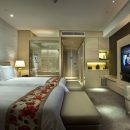Fort Bard Aosta: from military stronghold to museum
Bard, the smallest town in the region of Valle d’Aosta, is dominated by a splendid fortified building which stands on a rocky outcrop: il Forte.
To define it as a strong set of buildings that are located on the top and at different levels, and from which you can enjoy the panorama of the valley, is a bit simple, because you are dealing with a work of a really imposing military architecture. This group of buildings that we can admire and visit today has a very ancient origin, which has its roots in history and dating back to none other than the sixth century AD, when King Theodoric put here a garrison of 60 men to guard the borders of his reign. Today, with the clash of arms as a memory, the Fort Bard Aosta houses the Museum of the Alps and various exhibitions.
At Forte di Bard exhibitions and cultural events are held throughout the year, even though it seemed doomed to abandonment until a few years ago, like many other buildings belonging to the State, and its last role as a powder keg could not predict that today it would return to its former glory. Disposed of by the State in 1975, Forte di Bard has become a regional asset, and the small Valle d’Aosta, with a big financial commitment, was able to restore it and enhance it to the point that it has become one of the main museum attractions of the territory.
As mentioned earlier, the history of the fortress of Bard is long and, although we know almost nothing about its early centuries, it is mentioned in many medieval chronicles of travelers who, as early as the eleventh century, remained astonished by its grandeur and defined it as impregnable. Its strategic position on a spur overlooking the entire valley that narrows at that point, allowed to have full control of the road connecting Piedmont to France, and it was for this reason that the Viscount of Aosta, Boso, enlarged it and left it at the disposal of his heirs until the thirteenth century. After a period in which the fortress was used by the local feudal lords, the Bards, Amedeo IV of Savoy took possession of it (approximately half of the thirteenth century) and the fortress remained with the Savoy until their exile in 1946. Widened over the centuries by the dukes and princes of Piedmont, it met the last readjustment in the nineteenth century, when the Savoy began to build buildings along the slope in anticipation of a French attack that, in fact, never happened, and the fort came to be transformed into a military prison and then in a powder keg .
Currently two of the three main buildings which compose it are used as exhibition space, educational and interactive workshops. Only the lower part of the building, which is located at the lowest point, is closed to the public, while in the second, called Vittorio Opera, host an interactive program ( The Children’s Alps ),that encourages the younger to mountain-climb. Going up there’s the Piazza D’Armi con l’Opera Carlo Alberto, which hosts the Alpine Museum and temporary exhibitions on ground floor, while in the prisons below you can learn the history of the fortress.











